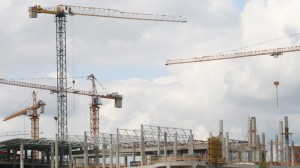
The Lithuanian government hopes the stimulus will help the country's beleaguered construction industry, whose activites have halved from last year. Half-built sites litter the capital Vilnius and other cities, victims of the crisis. Photo by Nathan Greenhalgh.
VILNIUS — The Lithuanian government announced on Friday that previously stalled funding for housing renovation loans will be disbursed immediately, freeing nearly 70 million litai (€20 million) to renovate mostly private housing in 280 communities.
The funds — two-thirds from banks and the rest from European Union structural funds — had been in deadlock since March, when they were first approved. The government had only agreed to guarantee 80 percent of the loans. This left the banks, which did not have enough in assets to post as collateral, to turn down the funding scheme, citing risk.
Three banks have since agreed to the loan: Šiauliu, Medicinos, and Parex. The financing breaks down as 45 percent loan, 50 percent government subsidy, as well as a 5 percent down payment from the homeowner’s association.
A new program Joint European Support for Sustainable Investment in City Area (JESSICA), which is partly funded by the European Investment Bank, will take 95 percent of the renovation costs from its own fund. The JESSICA funds are also ready to be disbursed.
Less than one month ago, Stasys Kropas, president of the Lithuanian Banking Association, told Baltic Reports that “it’s the banking business’ point of view that it’s quite risky” to give a loan to renovate without state guarantees.
Although the government has not agreed to cover the other 20 percent of the loan, INVEGA, a company that guarantees business investments, negotiated the terms of the contracts with the banks.
“Up to now there were no substantial changes, but there was a discussion on how to finish former renovation programs,” Kropas told Baltic Reports in a follow-up interview Tuesday. “In the new renovation schemes there are more options and more possibilities for some banks.”
Aloyzas Vitkauskas, a finance ministry vice minister, said in a phone interview that the first bank, Šiauliu, agreed to loan out funds about two weeks ago.
The agreement secures 70 million litai for the loans, with a ceiling of 1.5 million litai (€434,000) per loan. Over 200 associations have applied, said Audrius Zabotka, deputy director general of INVEGA. However, nothing has officially started yet.
“We are still waiting,” Zabotka said. “Hopefully the first project will show what is the main risk and how we can kill it.”
Construction volumes fell nearly 50 percent in the first six months of 2009, driving down prices through both a lack financing and demand.
“It’s too expensive to start, especially for those banks without experience in lending the funds for this type of client,” Vitkauskas said. “So for them, it is much more effective to prepare all the procedures and resources for the new program. I think this is also one of the reasons why these banks have already been working or taking part of this scheme. Now they started to lend the funds again to the same beneficiaries and they’re using INVEGA.”
When asked whether the government guarantees for the loans signaled an uptick in the Lithuanian economy, Kropas was cautiously optimistic. “To some extent,” he said, “at least some expectations are not so pessimistic.”
The government has created a website, www.atnaujinkbusta.lt, for people to find information on obtaining the renovation loans.












